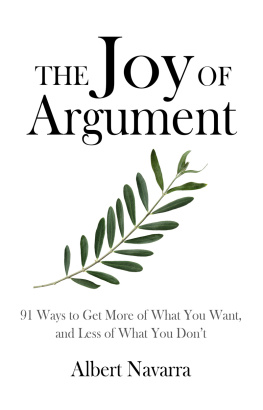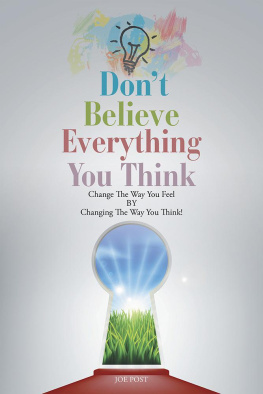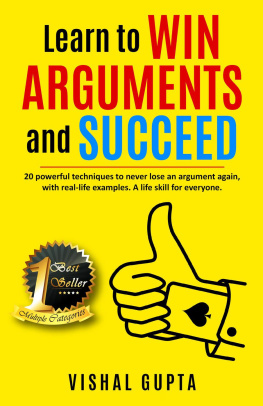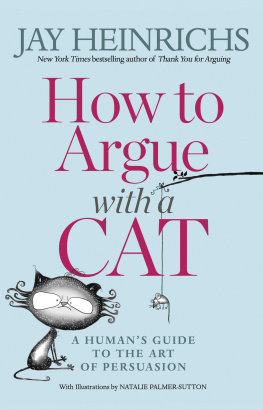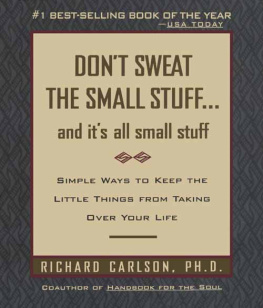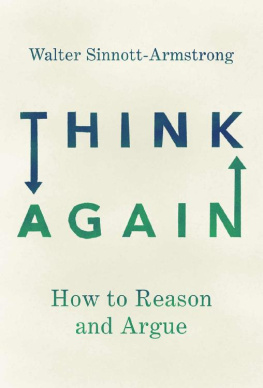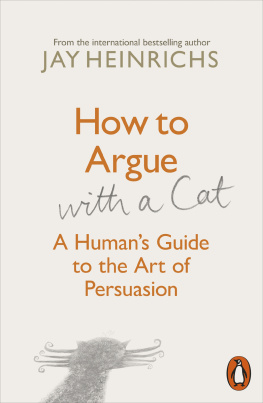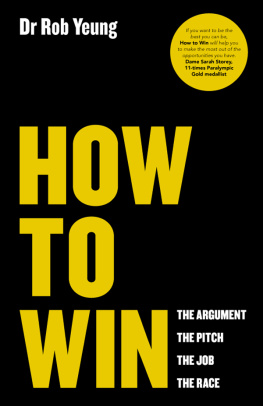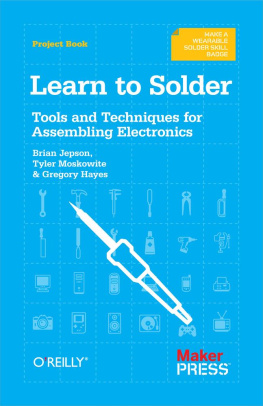Albert Navarra - The Joy of Argument
Here you can read online Albert Navarra - The Joy of Argument full text of the book (entire story) in english for free. Download pdf and epub, get meaning, cover and reviews about this ebook. year: 2015, publisher: Boyle & Dalton, genre: Religion. Description of the work, (preface) as well as reviews are available. Best literature library LitArk.com created for fans of good reading and offers a wide selection of genres:
Romance novel
Science fiction
Adventure
Detective
Science
History
Home and family
Prose
Art
Politics
Computer
Non-fiction
Religion
Business
Children
Humor
Choose a favorite category and find really read worthwhile books. Enjoy immersion in the world of imagination, feel the emotions of the characters or learn something new for yourself, make an fascinating discovery.
- Book:The Joy of Argument
- Author:
- Publisher:Boyle & Dalton
- Genre:
- Year:2015
- Rating:4 / 5
- Favourites:Add to favourites
- Your mark:
- 80
- 1
- 2
- 3
- 4
- 5
The Joy of Argument: summary, description and annotation
We offer to read an annotation, description, summary or preface (depends on what the author of the book "The Joy of Argument" wrote himself). If you haven't found the necessary information about the book — write in the comments, we will try to find it.
The Joy of Argument — read online for free the complete book (whole text) full work
Below is the text of the book, divided by pages. System saving the place of the last page read, allows you to conveniently read the book "The Joy of Argument" online for free, without having to search again every time where you left off. Put a bookmark, and you can go to the page where you finished reading at any time.
Font size:
Interval:
Bookmark:
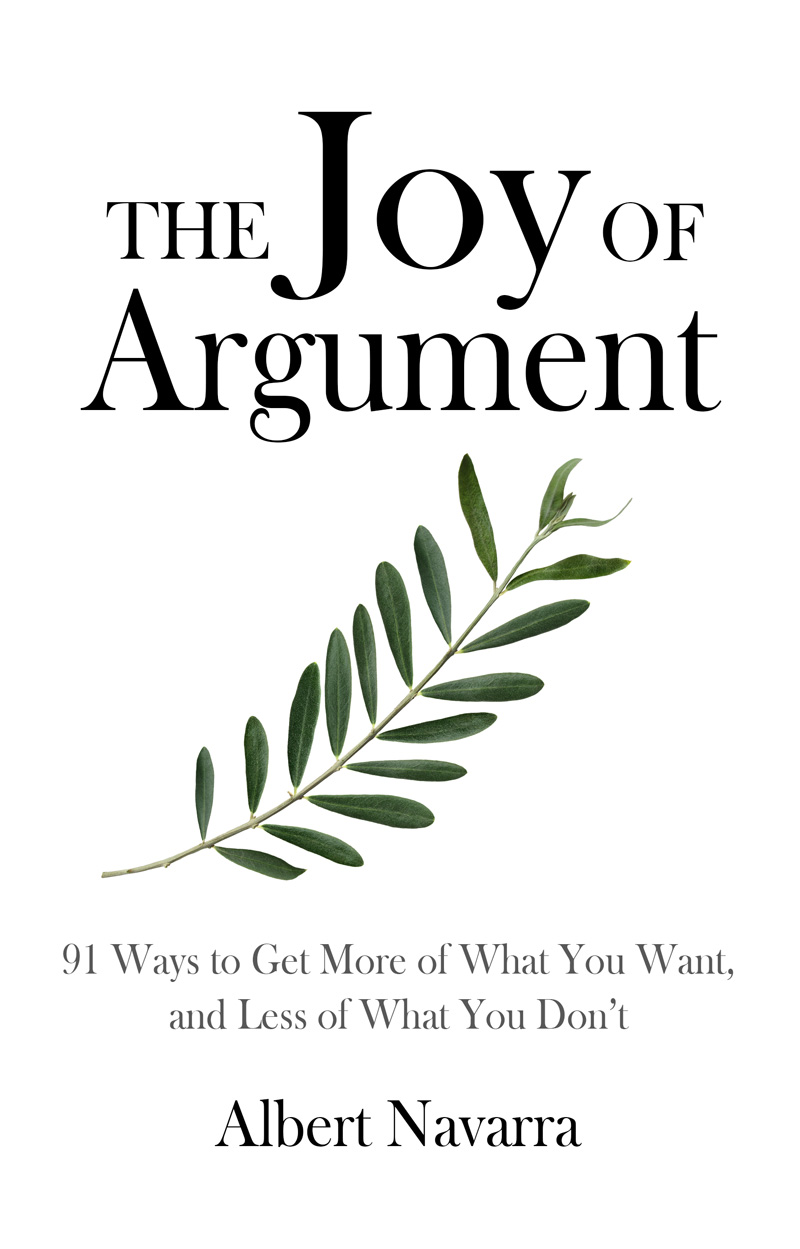

91 Ways to Get More of What You Want,and Less of What You Dont
Albert Navarra

Book Design & Production
Columbus Publishing Lab
www.ColumbusPublishingLab.com
Copyright 2015 by Albert Navarra
LCCN 2015947869
All rights reserved. This book, or parts thereof, may not be reproduced in any form without permission.
Paperback ISBN 978-1-63337-045-6
E-book ISBN 978-1-63337-050-0
Contents
For Ambu
Preface
There are things in life you want but will never get unless you learn how to argue for them. And there are things in life you dont want, but youll get anyway, if you let others persuade you with weak arguments. Here you will learn how to get more of what you want and less of what you dont. Youll learn the joy of argument. Lets get started.
Why Argue?
Ernest Hemingway said , The world is a fine place and worth fighting for. What does the world mean? It could be macro issues, for example, human rights, social and economic policies, and international peace and prosperity. If you care about these issues, they are certainly worth promoting through sound argument. But the world can also mean your world, in an individual sensefor example, your health, your work, and your relationships. These issues affect you directly and are worth improving through sound argument. So when you think about it, there are as many reasons to argue as there are reasons to live. Your life itself is an argument, a statement of your beliefs, values, and what is important to you.
You probably argue plenty already, maybe verbally with friends, spouses, children, in-laws, or coworkers, or in writings such as memos, emails, or presentations. Some of your arguments may be long and detailed, others only one sentence long. And others argue with you all the time! Every salesperson or advertisement that tries to sell you something makes an argument. Every politician who seeks your vote makes an argument. A job applicant who wants you to hire him or her makes an argument. A coworker who is trying to solve a problem makes an argument. Leaders who want to inspire make arguments. Hardly a day goes by in your life without an argument of some sort. Argument is simply part of life.
- The Key -
Argument is part of life and worth doing well.
An Argument Is Not a Fight
When many people hear argument, they think fight. But the two are not the same. A fight is a battlefor example, a physical altercation or a screaming match. An argument, as used here, is a rational discussion in which you prove a point with reasons. Fights dont provide much joy, but a good argument can. This book focuses on the joy of argument.
- The Key -
Argue, but dont fight.
What Good Comes of Argument?
Good argument is like fair competition; it makes things better. In a free market economy, market participants compete with each other to provide goods and services to consumers and clients. This competition lowers costs and improves quality. In a society with freedom of speech, a marketplace of ideas is created. Anyone can express his or her ideas, opinions, or proposed solutions to problems. Through vigorous and open discussion and debate, the best ideas and opinions prevail, eventually. And society is better off.
Good argument works the same way. A good argument is essentially a rational discussion where you make a point and back it up with relevant reasons. At the end of the day, the better argument should win. So better choices are made and better solutions are implemented.
Bad argument is like unfair competition; it makes things worse. Imagine an economy based on bribery, corruption, and monopoly. Prices skyrocket and quality plummets, along with quality of life. The same thing happens with bad argument. Argument that is irrational, irrelevant, or flawed leads to bad decisions, bad choices, and eventually, bad results. Health, wealth, relationships, and anything else you care about will suffer.
- The Key -
Good argument makes things better.
Win at Any Cost?
You will occasionally face the question of right and wrong when arguing. For centuries, the ancient Greeks believed there was a difference between right and wrong and that some things were always right (e.g., piety, or being religious), and some things were always wrong (e.g., impiety, or lack of respect for the sacred). These were called objective truths because they were always true, and their truth did not depend on subjective, changing factors such as the personal views of the person arguing, where they lived in the world, or what society or culture they belonged to. Then came the sophists.
The sophists were essentially private tutors, and their services were for hire. Wealthy Athenians would pay sophists to teach their children. The sophists shook things up because they argued there were no objective truths. There was no right and wrong, so when it came to the skill of argument, all that mattered was winning. Aristophanes was writing comedies during this time and described the sophists this way in a play called The Clouds : And if you pay them well, they can teach you how to win a case whether youre in the right or not.
Socrates was also around during this time, and he argued that there were such things as right and wrong, that there were objective, eternal truths. The question for you is whether you follow the sophists or Socrates. Assuming for the moment that you have a choice about what to argue, do you want to win every argument, no matter what, or do you want to get it right?
It feels good to win an argument. Its a feeling of affirmation, that your opinion is important, that you have the power to change things, and that your life matters. Its an existential rush. But should your goal be to win every argument? What if youre wrong? All those wonderful feelings of self-fulfillment may fade when you realize the damage you have caused. So consider and appreciate, first, the power you have to influence decisions and change things.
Youre in sales, and you convince a customer to buy something they really cannot afford. You win the sales argument, and reap a short-term benefit for yourself or your company. But you harmed the customer because they will suffer financial hardship. Is that what you want? Will the customer do business with you again? Will the customer recommend your company to others?
Youre a manager, and you propose a solution to a problem at work. But its not the best solution; in fact, its harmful. A coworker had a better idea, but he did not argue as well as you did. So you convinced the company to adopt your idea. You scored a short-term victory. But how long will the celebration last? Your solution will eventually hurt the company. Will the company still think you are a valuable asset to the organization? Will you get a bonus or raise? Will your track record help you obtain employment with another company?
If you fancy yourself a sophist, or youre undecided, consider following Socrates. The pleasure you get from winning an argument for the sake of money, fame, or anything other than the truth is fleeting. Bad decisions lead to bad consequences, which can steal away the very benefit you sought in the first place. Health, wealth, relationships, and anything else you care about will eventually suffer. Its not always clear what is right and what is wrong. Even Socrates never figured it out. But while winning at any cost may bring short-lived fun, the joy of argument, and long-term happiness, comes from trying to get it right, and sometimes doing so.
Font size:
Interval:
Bookmark:
Similar books «The Joy of Argument»
Look at similar books to The Joy of Argument. We have selected literature similar in name and meaning in the hope of providing readers with more options to find new, interesting, not yet read works.
Discussion, reviews of the book The Joy of Argument and just readers' own opinions. Leave your comments, write what you think about the work, its meaning or the main characters. Specify what exactly you liked and what you didn't like, and why you think so.

